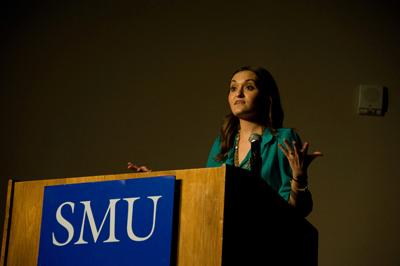
Kimberly Elmazi, Student Senate Diversity chair, speaks about diversity. (Sidney Hollingsworth/The Daily Campus)
While SMU may be off the list of most homophobic schools in the U.S., some think that prejudice and bias are still strong on campus.
Such sentiments and potential solutions to those issues were discussed in “The Elephant in the Room: Battle Bias” town hall meeting that was held Tuesday night in the HughesTrigg Theatre.
“When people look at me, they assume I am white. I am Hispanic, half Columbian, and half Mexican,” SMU student Briana Monsalve said.
“No one sees that. It’s part of the stereotypical viewpoints we have about particular races. We think we are supposed to talk a certain way, act a certain way, carry ourselves a certain way.”
“I didn’t realize there was a certain way I was supposed to speak, I thought we were all just speaking English.”
Others expressed their concern of removing parts of a culture from the context they belong in.
“I’m tired of seeing different cultures being made a costume. That’s not who we are. That’s taking an aspect of what might be our culture and taking it out of context,” Oscar Cetino said.
The idea of having a town hall meeting arose after various events that were seen as discriminatory occurred on campus.
“It was mainly in response to the fact that many organizations and individuals on campus were hurt and offended by the vandalism that was happening on campus. And frankly vandalism is a form of bullying and shouldn’t be tolerated on campus,” Kimberly Elmazi, chair of the Student Senate Diversity Committee, said.
The issues were concerning for many at the gathering, but several people introduced the idea that the events were isolated and did not accurately reflect the SMU community as a whole.
“We can’t let a few jerks become the face of our community because there are also a lot of good, kind people who want to be a part of this discussion,” sophomore Kelly Kiser said.
Fellow organization leaders echoed some of the thoughts expressed at the meeting.
“Although we do feel somewhat respected, I wouldn’t go so far as to say we are equally respected on campus. And obviously, we are not equally represented,” Hannah Park, president of the Asian Council in an email, said.
“I think there is a bias on campus and I think it might exist because the minority population is a small percentage of SMU. There still aren’t at least 400 black undergraduate students, including student athletes,” Devean Owens, the president of the Association of Black Students, said.
According to SMU’s campus profile on its website, there were 2,647 minority students enrolled on SMU’s campus in the fall of 2011 out of a total enrollment, graduate and undergraduate, of 10, 982.
Based off of this statistic, the minority demographic makes up 24.1 percent of SMU’s campus.
The proposed solution posed by town hall participants was greater education and awareness.
“I think a solution to this is spreading awareness of not only Asian culture, but other cultures as well, throughout our campus,” said Park.
“Having other leaders of other organizations go through a diversity training would change people’s point of view and widen their perspective on people of different ethnic backgrounds.”
“I feel like the majority of students haven’t been around multicultural students so they don’t know how to act around them. It’s not like they’re racist or anything, they just genuinely don’t know,” Owens said.
“It has to start with dialogue and spreading the word.”











